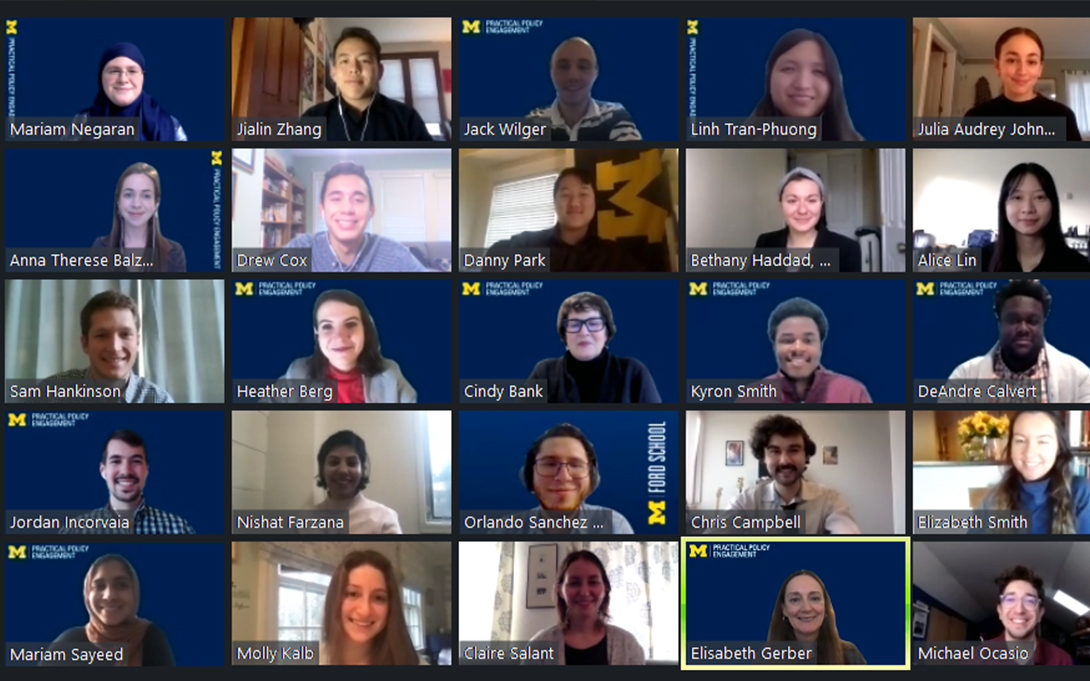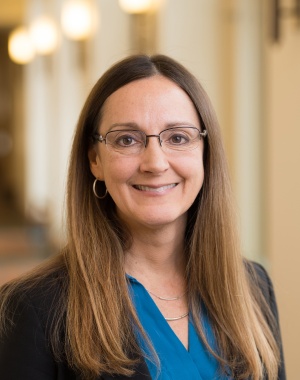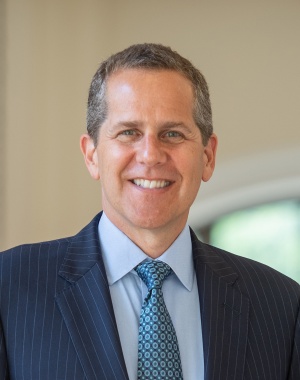
Ford School students engaged in real problem-solving in the fall 2020 semester, tackling some of the most important issues facing Michigan. The undergraduate and graduate students participated in research and analysis projects as a part of the Program in Practical Policy Engagement’s (P3E) Practical Community Learning Project and Student Research Initiative.
At the end-of-semester showcase, the students outlined their work supporting micro businesses, reforming community police practices, putting the nursing home response to COVID 19 into context, combatting the school-to-prison pipeline, engaging Michiganders in the redistricting process, and helping solve an environmental waste conundrum.
Dean Michael Barr told the group, “This is one of my favorite sessions every semester because I'm just so blown away by the creativity and the hard work and stick-to-it-ness and the ingenuity that you all put into your work. I know that it actually feeds directly into work that is going on in communities on the ground and it makes a real difference to have your help and assistance in this process. I know that you learn a lot from your clients and they learn a lot from you.” He also thanked Phil and Kathy Power for their long-term support for the P3E program.
Professor Elisabeth Gerber, director of P3E, echoed Barr. “I have the best job in the whole wide world because I get to see a bit of all of this wonderful work and to watch the students go through these projects. I know that your community partners have learned so much and will continue to learn from you and use your work and your materials.”
P3E’s mission, to “ leverage existing expertise and interdisciplinary approaches to generate policy–relevant research, analysis and learning,” was clearly in evidence, as were the three pillars of the program, engaged learning, policy research, and policy impact.
You can watch the full presentations here.
New Economy Initiative: Micro-business support
Michael Ocasio (BA ‘21), Orlando Sanchez Zavala (MPP ‘21), Jack Wilger (MPP ‘22) worked with the New Economy Initiative (NEI) in Detroit to assess the resources available to micro businesses -- those with less than 10 employees and often revenues of around $100,000 -- which have been especially hard hit by the COVID-19 economic recession. It was a last-minute project, proposed by NEI in October. While NEI has served more than 7,500 micro businesses in the past three years, gaps remain in these businesses’ ability to access capital. The students found three main barriers: commercial banks are wary of lending to micro businesses because of their size and lack of assets (and because most are minority- and/or women-owned, they are subject to systemic racism); lack of counseling and mentorship; and unfriendly licensing and regulatory regimes. The students are generating a report based on their investigation of the situation on the ground and a review of best practices from around the country, hoping to inform financial institutions, non-profit organizations and potential investors about the needs -- and potential -- of micro businesses in southeast Michigan.
“It's been very eye-opening to us to really learn how much micro businesses contribute to local economies and the value they provide, since I think this can be invisible to a lot of people,” said Wilger. “And we've also learned that what makes government programs successful is that it's not enough for programs just to exist. They need to be accessible to help their desired targets.”
Port of Monroe: Repurposing coal bottom ash
Another economic development project sought to find a solution for an environmental issue: what to do with several thousand tons of coal bottom ash, a by-product of the coal burning process, which could be transported through the Port of Monroe, Michigan’s only port on Lake Erie. It is the fifth project P3E has done with the Port. The team of Drew Cox (BA ‘22), Nishat Farzana (MPP 21), Julia Johnston (BA ‘22) and Sam Hankinson, a student from Central Michigan University (BA ‘21), looked for new markets for the by-product. They looked at a matrix of environmental laws and regulations, the policy landscape, environmental impact and economic feasibility of a number of possible uses. Their determination was that use of coal bottom ash in producing cement made the most sense.
Johnston said that from an environmental perspective, “the landfill option was a worst case scenario, because we were hoping to be able to reuse this product in a way that makes it so that it does not go to waste.”
Farzana said that to understand the issue requires, “different approaches, using different lists like social and economic policy and related laws and regulations. I understood that the role of exogenous constraints can play a huge role in terms of designing a policy.”
Added Cox, “We really see this has potential, not only from an economic perspective, but an environmental perspective, if these markets can be developed.”
Voters Not Politicians: Community of Interest outreach video
Another important topic in Michigan is redistricting, as the state is undertaking a new process, after the law was changed by a voter-initiated 2018 constitutional amendment. One important component of how the Independent Citizens’ Redistricting Commission is drawing the new map is the concept of “Communities of Interest (COI).” Molly Kalb (BA ‘21) and Mariam Sayeed (MPP ‘21) worked with Voters Not Politicians, the group behind the referendum, to create a video that will raise awareness of COIs, to engage historically underrepresented and marginalized communities. After looking at how other states have engaged with independent commissions, their video included testimonials from those states, with the message, “It’s time WE draw the line.”
Sayeed noted, “The definition has a lot of different meanings for each person, but at the end of the day, people won't consider what your perspective is unless you share it with the people who are in power which in this case is the commissioners.”
According to Kalb, “Michigan is actually one of the largest redistricting restructurings that has ever happened. There's a lot to learn from the similar processes that have happened but there's also a lot that we're doing for the first time.”
Peace and Justice in Detroit: Police and community relations
The interaction between police and the community it serves has been at the forefront of national discussion in the aftermath of a summer of police shootings and radial protest. Five students -- Eshaan Kawlra (BA ‘22), Rachel Shafer (MPP ‘22), Kyron Smith (MPP ‘22), Linh Tran-Phuong (MPP ‘22) and Jialin Zhang (BA ‘22) -- partnered with Peace and Justice in Detroit. To focus the research on the massive topic area, they worked with their partner on looking at factors to create a trauma-informed police force.
They examined trauma and escalation training for police departments, the polarized role of police officers to both enforce the law and engage with the community, and the role of trauma within the police departments themselves. In conversation with experts, officers, and community leaders, they also explored the interaction of youth and police.
Linh noted that trauma within policing doesn’t get enough attention. There is some research, but in speaking with the officers they wanted it to be more of a spotlight.
For Kwalra, it was valuable to translate the aspirations of the BLM movement to real recommendations that could make a difference.
The team’s final report will be used in two ways. First, the information will strengthen the organization's work and programming. Second, it will inform the policy recommendations made to the Detroit Police Department through their continued communication and growing, positive relationship.
Oakland County School Board Association: DE&I research
Four Ford School students examined the connection between schools and the juvenile justice system, in the context of how it is affected by diversity, equity, and inclusion opportunities. Using the framework of the school-to-prison pipeline, the team, Anna Balzer (MPA ‘21), Heather Berg (MPP/MBA ‘23), Jordan Incorvaia (MPP ‘22) and Claire Salant (MPP ‘22) sought to compare student codes of conduct and discipline outcomes throughout Oakland County schools. “We wanted to really laser in on specifically what practices in school discipline looked like across Oakland County schools. We know from existing research that suspension and expulsion rates have many different effects on students' life outcomes, whether that's graduation rates, college attendance rates, or likelihood of ending up having a touch point with the juvenile justice system,” explained Berg.
They had wanted to look at data on disciplinary actions and expulsion rates, and break them down by race. However, when they discovered that those figures were not available, they pivoted and turned their examination to a review of the schools’ formal codes of conduct as well as an anonymous survey of school administrators. The rubric they created showed potential offenses, enforcement, school or police interventions, and restorative practices.
Balzer reported, “We found that administrators are saying that their biggest challenges to school discipline was time. We also know that restorative justice practices by nature take longer. So our administrators need more time, resources and staff capacity to be able to do restorative justice effectively.”
The final report to the Oakland County School Board Association, and in particular to its DE&I committee, suggests steps for further research, highlights the best practices in discipline policy, and identifies opportunities for immediate improvement.
And another conclusion from their research process: Making surveys anonymous is hard; distributing them is harder!
Office of State Representative Kevin Coleman: COVID-19 and nursing home policies
The statistics are startling. It is estimated that 40-45% of reported COVID-19 deaths have involved nursing homes residents or nursing home employees across the nation. The pandemic has exposed gaps in the healthcare system for those residents and health workers. Michigan State Representative Kevin Coleman (D-16th) is on the state’s Nursing Home Reform Working Group and was looking for recommendations he could take to the Legislature. Four students -- Chris Campbell (PhD candidate), Alice Lin (BA ‘21), Daniel Park (MPP/ MHSA ‘22), and Bethany Haddad (MPP ‘22) -- built on previous work done by Molly Kalb (BA ‘21) to make data-driven policy proposals.
They looked at existing and proposed legislation in all 50 states and at the federal level, including staffing levels and working conditions, PPE availability, testing mandates, and data transparency to the public and to families. Quantitative measures of nursing home deaths, measured against regulatory requirements and demographics, yielded insights into the main causes of those deaths: infections coming from staff and from other residents. They saw that Michigan’s mortality rate was slightly higher than the national average.
Policy recommendations included improving staffing levels, PPE stockpiling, establishing infection prevention plans and improving long-term quality programs. Translating that into legislation with budgetary clout will be difficult.
“There are a lot of moving parts when it comes to addressing pandemic safety, the toll on human life over the past nine months has been pretty incalculable. Effectively addressing this issue ties in questions of labor economics, health policy, and epidemiology. Our client, Representative Coleman has to get all this passed in the Legislature, so political maneuvering is involved as well,” explained Campbell.
Park concluded, “This has become a political issue, no matter what the research says. So it's up to members to ultimately turn that advocacy in that political work. I would hope to think that this does have more of a nonpartisan manner. Because this virus doesn't really care about which political side you've been on.”


